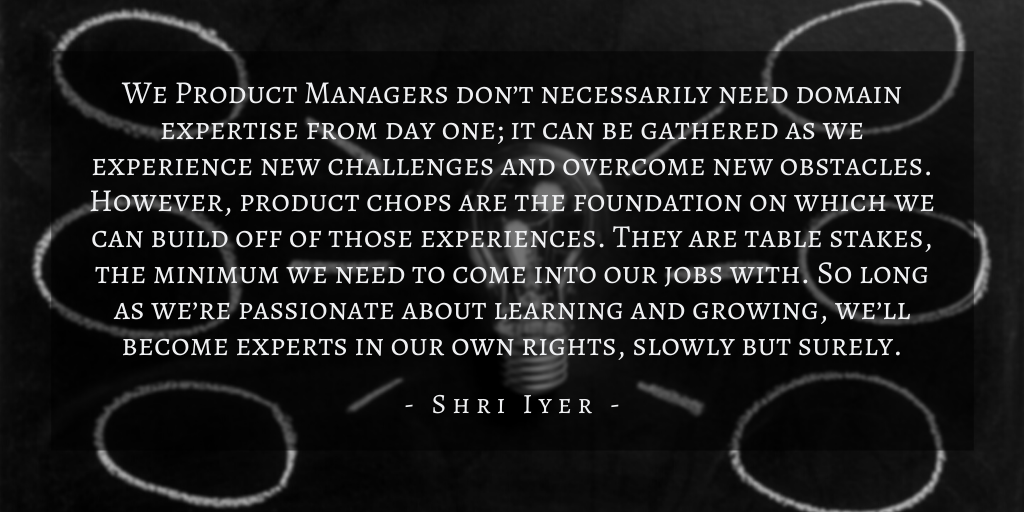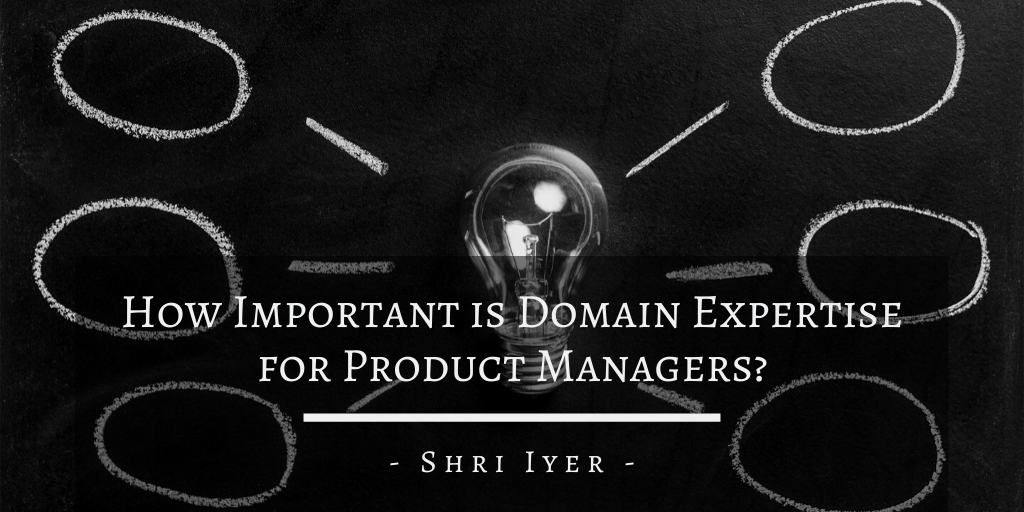Is domain expertise important for Product Managers (PMs)? This is a pretty divisive question, and I’ve met my fair share of PMs and leaders on both ends of the spectrum. The reason why this is such a divisive question is because it becomes a key decision point in hiring a product manager or not. Before we delve in, I want to clarify that when I say domain expertise, I am referring to subject matter expertise. In this case, let’s define “domain expertise” as the mastery of skills, knowledge, and similar expertise within a domain sphere. Alternatively, “domain knowledge” would be a general awareness of a sphere. In essence, the question I’m asking (and one asked many times before) is, does a healthcare technology company need to hire a PM who has worked extensively in the healthcare industry? Or, does a FinTech startup need a finance expert to fill the role of a Product Manager? To put it simply: is domain expertise what truly matters for a successful PM?
While I’d love to offer a quick answer, it’s a Herculean task to even broach the question. After all, many articles I’ve read arguing for one side have been written in response to suppositions by the other side. And, rather than jumping head-first into a heated discussion, I want to offer opinions from all ends of the spectrum.
On The One Hand…
Starting broad, authors Blair Reeves and Benjamin Gaines defined three types of knowledge that all PMs should seek in their work, “Building Products for the Enterprise.” Those three categories are:
- Organizational Knowledge – “Understanding how your company really works,” gained through tenure.
- Product Knowledge – “Knowing the ins and outs of your product,” which can help build empathy and trust between you, your team, and your end-users.
- Industry Knowledge – “The most important of these three areas of knowledge because it represents a deep and thorough understanding of customer problems that remain unsolved,” described by Reeves and Gaines as being the type of knowledge “directly associated with the ability to deliver successful products that will grow your company’s revenue.”
In this instance, industry knowledge is virtually synonymous with domain expertise. While Reeves and Gaines don’t want to pick favorites between the three types of knowledge, they believe that, at the end of the day, understanding the industry is more vital than understanding your organization or product. If you find yourself disagreeing with this sentiment, you’ll understand where the divisiveness of Product Management success comes from. If not, allow me to elaborate further.
On The Other Hand…
Product Management blogger Jeff Lash doesn’t mince words when he writes, “if you want to be a bad product manager, assume that domain knowledge is all you need to succeed […] if you want to be a good product manager, make sure to have the right amount of knowledge about the domain in which you are working.” In a nutshell, Lash says that it’s not about how much you know, it’s about what you know.
Now, this is where PMs split off—some swear by domain expertise, while others believe that it’s all about balancing knowledge of various domains and skills. For the latter, a group that includes Lash, domain knowledge is important, but domain expertise is less so.
“You don’t need to be a lawyer to develop products for lawyers,” Lash writes. And, for many, these words ring true—it’s not about being an expert; in fact, it’s never been. To be a successful Product Manager, you don’t need to be the wisest and best in your domain. You need to have soft skills, communication capabilities, and—above all—the ability to adapt.
Product Management expert, guru and author Rich Mironov strongly agrees with such a sentiment. In “This Is Why I Hire First for Product Experience,” Mironov writes about the often ungangly shape of Product Management, a shape that varies between companies and, of course, industries.
In this regard, Mironov’s point is that he’d rather hire a PM than a domain expertise-wielding professional. And, given Mironov’s explanations, this makes sense—the skills required to be a Product Manager are various and sundry, and hiring managers seek PMs who have had a chance to hone those softer skills. In addition, Mironov cites the importance of hiring PMs due to their ability to fill in the “blind spots” of other teams. He uses the example of an engineering team, which is more than capable of designing and generating a product, but may struggle with the marketing and sales aspect of business. Therefore, there isn’t as much necessity for PMs to have domain expertise, rather general knowledge of the domain that can be built upon.
Perhaps the strongest case Mironov makes for hiring PMs rather than domain experts is from his own experience when working with the latter: “I’ve mentored up some engineers into great product managers,” Mironov says, “but there was a lot of learning along the way.”
Where Everyone Agrees
Can a PM be a jack—and master—of all trades? Or, at least, more than one? Marty Cagan, a guru in the industry of Product Management, doesn’t see the benefit in having complete domain knowledge and expertise from the get-go. As he writes in “The Role of Domain Experience,” it’s about being a fast learner, not an inherent master in your field. In fact, Cagan writes, “It can be dangerous for a product manager to have too much domain expertise.” Why? Because the PM can conflate their expertise in an industry for expertise in how customers think. However, while the PM is an advocate for a product, they must also be the one to help convince a target audience that they, too, should advocate for the product.
Cagan clarifies that understanding the product domain is “absolutely essential,” but that he would consider “about 80% of the skills and talents of a product manager to be applicable across the different types of products.” What are those skills? Across most industries, they’re referred to as “soft skills.” The abilities to communicate, lead, and negotiate are vital to almost every professional, but they’re particularly vital to PMs.
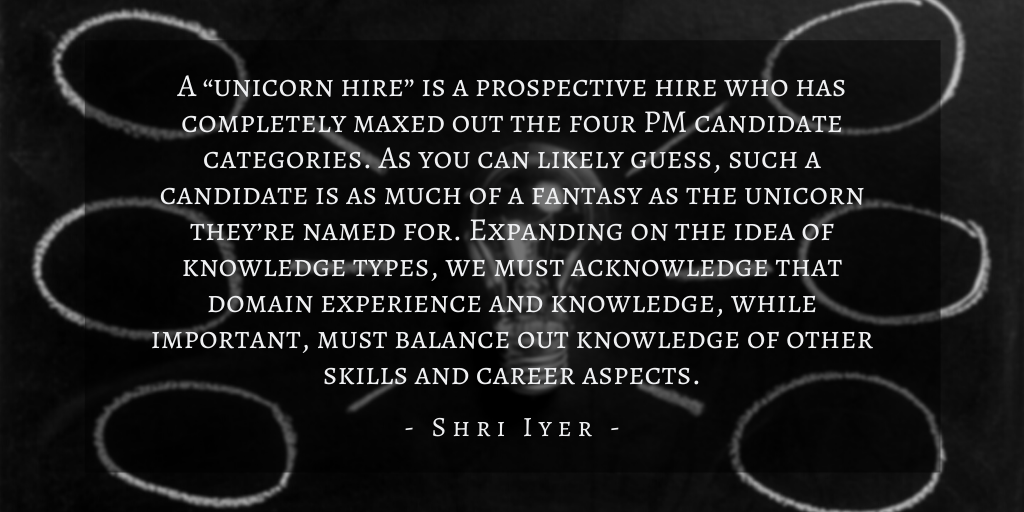
But what about the learning element of Product Management? Much of the knowledge gathered by PMs is collected on the job, from bonafide experience and the tutelage of others. Product Management Executive Tanya Elkins has discussed her role in the hiring process, working to bolster the knowledge and experiences of fresh-faced PMs. In an interview about women in product, Elkins highlights the risk of seeking out “unicorn hires,” known in layman’s terms as the perfect employee. Of course, someone knowledgeable of industries, rich in experiences, understanding of customers, and proficient in Product Management is about as rare as the sun is hot. That’s why Elkins suggests four categories with which hiring managers can assess PM candidates:
- Product Management experience
- Fit with the team and customers
- Unique contributions that the candidate offers
- Domain knowledge
The aforementioned “unicorn hire” is a prospective hire who has completely maxed out the four PM candidate categories. Of course, as you can likely guess, such a candidate is as much of a fantasy as the unicorn they’re named for. Expanding on the idea of knowledge types, we must acknowledge that domain experience and knowledge, while important, must balance out knowledge of other skills and career aspects.
Where Some Disagree
So, it appears that many Product Managers agree that domain knowledge is important, but not domain expertise. However, the question then becomes, how and when should that domain knowledge manifest? Recall the question posed in my introductory paragraph, about whether FinTech tech firms should hire a finance expert to fill in as a PM.
Drawing from my own experience, as someone who earned a degree in finance and first worked in the financial sector, I’ve learned that going into a position with extensive domain expertise is not always as beneficial as one may believe. My move into the human capital management domain as a PM exemplifies this well. I’m not a manager, nor an HR business professional, but the domain was something I was able to learn. It certainly takes time, but working alongside other people who had prior expertise, I was able to be brought under several wings and learn from a flock of tutors. Now, I work in legal tech. I’m not a lawyer by any means, but I’m learning about the industry as I go, developing my domain knowledge of the niche into something that can bolster my abilities to manage and lead.
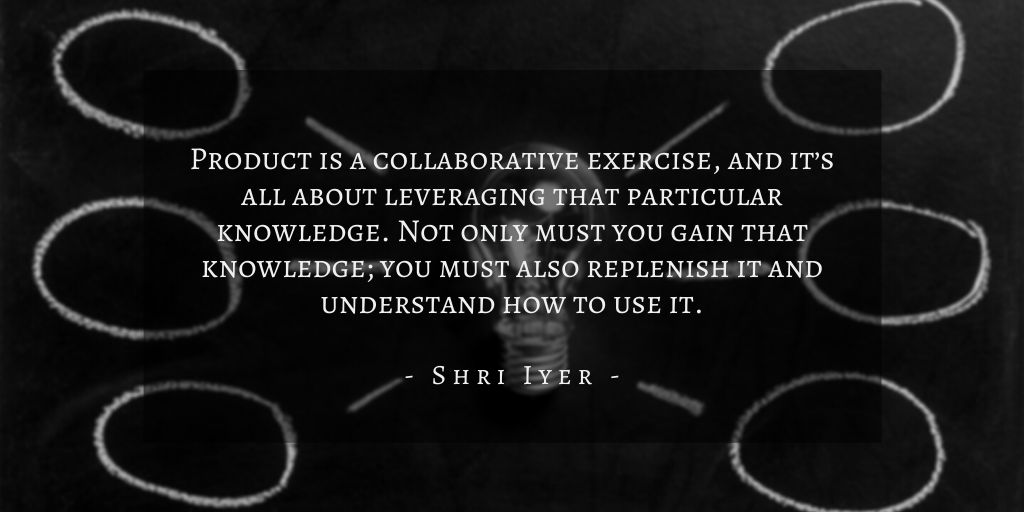
Product is a collaborative exercise, and it’s all about leveraging that particular knowledge. Not only must you gain that knowledge; you must also replenish it and understand how to use it.
In the aforementioned article about women in product, a second professional—Pivotal Labs Product Manager Kate Griggs highlighted the importance of universal skills for successful PMs. As Griggs puts it, “It’s not the industry experience that matters; it’s the experience itself.” She elaborates on this concept further, explaining that general experiences with failures and successes can often be the best teaching moments, and don’t have to be experienced in a given domain.
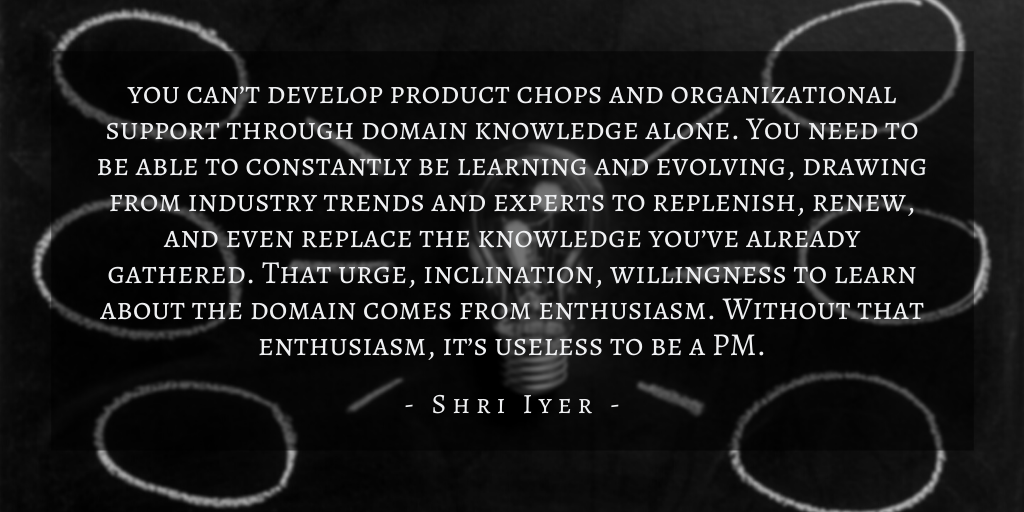
This is why soft skills are so important—you can’t develop product chops and organizational support through domain knowledge alone. You need to be able to constantly be learning and evolving, drawing from industry trends and experts to replenish, renew, and even replace the knowledge you’ve already gathered. That urge, inclination, willingness to learn about the domain comes from enthusiasm. Without that enthusiasm, it’s useless to be a PM.
We Product Managers don’t necessarily need domain expertise from day one; it can be gathered as we experience new challenges and overcome new obstacles. However, product chops are the foundation on which we can build off of those experiences. They are table stakes, the minimum we need to come into our jobs with. So long as we’re passionate about learning and growing, we’ll become experts in our own rights, slowly but surely.
